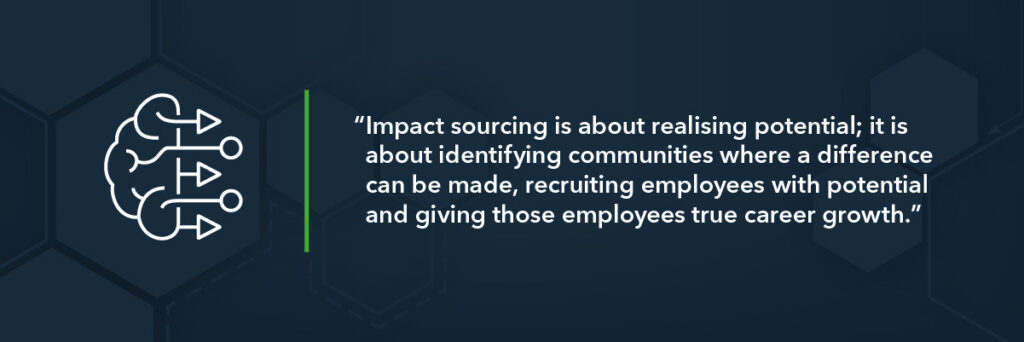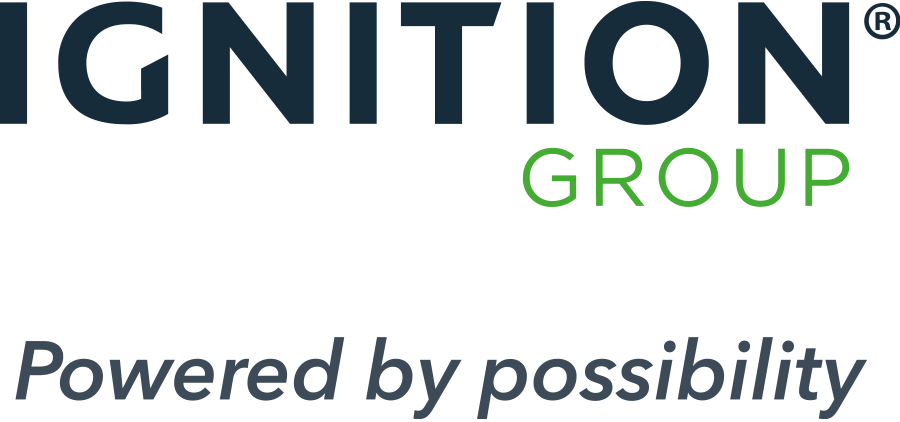
South Africa is a country with great potential for impact sourcing, a business model that creates jobs and provides training to marginalised communities. In recent years, impact sourcing has gained traction as a powerful tool for social and economic development. By outsourcing business processes to companies that intentionally employ and train individuals from underrepresented communities, impact sourcing not only generates income but also creates a positive social impact.
Impacting the individual
When we look at the communities around Ignition, for example, there are large pools of people who have been unable to enter the job market due to a number of reasons. There are people who haven’t been able to complete their formal education.
There are also people who have managed to complete their education, even tertiary education, but still haven’t been able to get a job – remember, South Africa has an official unemployment rate of around 33%! There’s also the experience paradox – companies want employees with experience, but how do those employees get experience in the first place?
In South Africa, impact sourcing has the potential to address some of the most pressing social issues, including unemployment, poverty and inequality.
Benefitting/Impacting the community
In many South African communities, it is estimated that a single employed person supports 5-6 family members, multiplying the benefits of employment by a significant factor.
Many South African communities are largely isolated from the formal economy – the high unemployment rates are coupled with low earning power to create high levels of entrenched poverty. Impact sourcing directly benefits these communities by both employing more people and giving them higher earning power as well as future prospects. Money is brought back to and spent in the communities, creating a stronger trickle-down economy.
Then there are other direct benefits: members of the community are better fed and healthier, parents are able to educate their children better, members of the community are given hope for their own future.
These factors result in reducing crime rates and other social ills, and the benefits start to snowball.
Benefitting/Impacting the business
One of the main benefits of impact sourcing is that it enables businesses to tap into a vast pool of talent in regions where traditional employment opportunities are limited. This not only benefits the workers but also the companies themselves – research has indicated that there are a number of ways in which impact employees actually outperform other employees, making them highly desirable.
High performance
It’s easy to understand – if you’ve been part of the unemployed 33% for a while, you will be excited and motivated when given an opportunity to get not only a job, but a long-term career with growth prospects. Individuals belonging to marginalised communities tend to seize opportunities and commit to developing long-term careers, often performing in the upper percentiles of the workforce.
Lower turnover
Studies by The Rockefeller Foundation show that “impact workers have 15-40% lower attrition than traditional BPO workers and exhibit high motivation levels that leads to improved performance over a period of time and lower hiring and training costs.” This sort of stability in a workforce is desirable from both a supplier and client point of view, and the long-term costs involved in training and recruiting are also substantially lowered.
Ignition’s approach to Impact Sourcing
Ignition believes that impact sourcing is about realising potential.
It is about identifying communities where a difference can be made, recruiting employees with potential, training those employees and giving them growth prospects and assistance in career progression.
Ignition established the Ignite Training Academy with this particular goal in mind. It is actually a fully accredited institute of learning with the Department of Education and can issue national certificates in industry-specific fields. It also runs in-house programmes such as the Activate Programme, which has been developed to upskill new hires with no industry-specific experience so that they can get employed and then gain that experience.
From that broad skills base, graduates of the Activate Programme are moved onto training for specific roles within the company. It doesn’t end there, though – the Learning and Development Department have an established career development pathway for employees to be guided along. This includes leadership development programmes, subject matter expert programmes and more.
This pipeline is largely focused on linear career development, obviously, but at Ignition it is definitely not limited to that. If an Ignition employee identifies an area in the business that they would enjoy working in, we try to make that happen through study assistance and internal placement.
For example, one of our sales experts realised he had a passion for It, so we enabled his IT training and he recently moved into the IT department.
The L&D Department also identifies high potential employees within Ignition ad facilitates continuous professional development in their field, through further studies, conferences and peer-to-peer training.
Impact Sourcing is a major buzzword in business today, but at Ignition it is much more than that – it is the way we have been building communities as Ignition itself has grown for over 20 years.
We have recognised that it is a valuable tool for creating positive social impact and empowering South Africa’s workforce. By providing employment opportunities in regions where traditional jobs are scarce, it has the potential to make a real difference in the lives of workers and their families.
With the right support and investment, impact sourcing has the potential to be a key driver of economic growth and development in South Africa.
Sashnee Pitt is Head of Learning and Development for Ignition Group.


